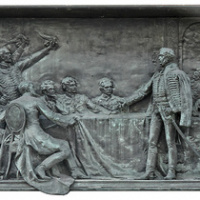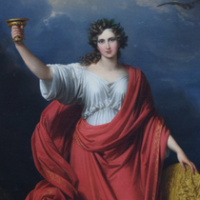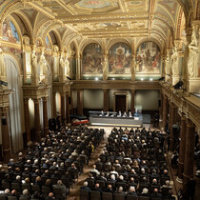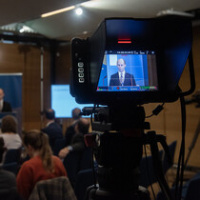Mágusok és iónok – Gregory Nagy külső tag székfoglaló előadása
Gregory Nagy külső tag 2017. június 26-án megtartotta akadémiai székfoglalóját. Az előadásról szóló videót képgalériával, videóval és angol nyelvű összefoglalóval kiegészítve közöljük.
There is a problem with the meaning of the Greek word mágos (μάγος), which was borrowed into the Greek language from Old Persian. In the Bisotun Inscription, which celebrates the accession of Darius in 522 BCE and his subsequent successes as the new king of the Persian Empire, the corresponding Old Persian word is maguš, referring to a man named Gaumāta who was accused of an attempt to usurp the Persian kingship. In the History of Herodotus (3.61–79), there is a convergent narrative about a mágos who attempted to usurp the kingship, though his name is given there as Smerdis. In any case, here is the problem: aside from the idea that, once upon a time, a maguš / mágos attempted a usurpation, the contexts of mágos in Greek sources do not match neatly the contexts of Old Persian maguš and of its cognates as found in other Iranian languages. Aiming at a solution to this problem, I argue that the Greek and the Iranian contexts of the word can best be understood by taking a closer look at historical evidence for interactions between Greeks and Persians in the sixth, fifth, and fourth centuries BCE. On the basis of such evidence, I also argue that the mediators for the word mágos and for the ideas underlying this word were the Ionians.
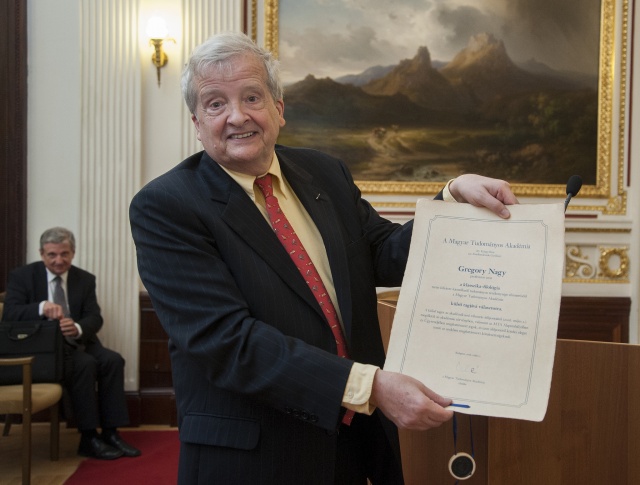 Gregory Nagy Fotó: mta.hu/Szigeti Tamás
Gregory Nagy Fotó: mta.hu/Szigeti TamásKépgaléria a székfoglaló előadásrólIn making my argument, I re-examine the relevant evidence of two major Greek sources: one is the History of Herodotus, composed in the Ionic dialect, and the other is the Derveni Papyrus. Though the writing-down of the text that we read in the papyrus is generally dated to the fourth century BCE, the author of the text itself can be dated further back, to the fifth century BCE, and so he is roughly contemporaneous with Herodotus himself. Moreover, just as Herodotus composed in Ionic, that is, in the dialect of the Ionians, so too the language used by the author of the Derveni Papyrus, although the text is composed in the Attic dialect, has been shown to be heavily influenced by the Ionic dialect.
Both of these two fifth-century Greek sources provide essential pieces of information about the role of a typical maguš / mágos in the era of the Achaemenid dynasty, which ruled the Persian Empire from around 550 to 330 BCE. To start, I highlight what we read in Column VI of the Derveni Papyrus about mágoi as models for the performance of rituals by
mústai, that is, by ‘initiands’. Referring to eukhaí ‘prayers’ and thusíai ‘sacrifices’, the author of the text goes on to say that the mágoi in such ritual contexts are known to perform what he calls an epōidḗ ‘incantation’.
I find it relevant to compare what we read in Herodotus (1.132) about the role of mágoi in authorizing a thusíā ‘sacrifice’ by way of their singing an epōidḗ ‘incantation’, which is described as a theogoníē ‘theogony’. Here we see the idea of singing about the cosmos— even singing the cosmos—linked with the idea of authorizing a sacrifice. From a comparative point of view, as we know from surveying a wide variety of cross-cultural evidence, the performance of a theogony can function as an authorization of kingship.
Also relevant is what we read in Herodotus (7.191) about mágoi who are described as sacrificing (éntoma poieûntes) and singing incantations (kataeídontes boêisi) in response to a violent wind that had at that time seriously damaged the fleet of the Persian Empire by destroying many of its ships anchored in the shallows at Cape Sepias. The context makes it clear that the mágoi were performing these rituals in order to salvage the royal project of Xerxes, the new king of the Persian Empire, who was attempting to conquer the Greeks inhabiting the mainland situated on the European side of the Aegean Sea. Further, these mágoi are described as also sacrificing (thúontes) to the goddess Thetis, mother of Achilles, and to her sister goddesses, the Nereids. Herodotus (7.191–192) says more: the mágoi sacrificed (éthuon) to Thetis because of what they had heard ‘from the Ionians’ (parà tôn Iṓnōn). What they heard, as Herodotus (7.192), recounts, is a sacred narrative about Cape Sepias, the place situated on the European coast where the fleet of the Persian Empire was damaged by the violent wind: it was at this same place, the Ionians told the mágoi, that Achilles was conceived when his immortal mother Thetis was impregnated by his mortal father Peleus. Given the fact that the native Greek narratives attributed cosmic powers to the goddess Thetis, I argue that we see here another example of a link between the idea that the mágoi have the power to sing the cosmos and the idea of their authorizing a sacrifice by way of their incantations.
But who were these Ionians who had narrated for the mágoi the sacred narrative that led to the sacrifice? It is clear from what we read in Herodotus (7.191–192) that these Ionians were Asiatic Greeks who were fighting on the side of the Persians and against the Greeks of Europe who were defending their homeland from the invasion initiated by Xerxes. These Ionians were serving in the invading navy of the multiethnic Persian Empire.
By studying the political and cultural identity of these Greeks who called themselves Ionians, I argue, we can develop a holistic explanation for the meaning of the word mágoi in Greek. And that is because these Greeks, as Ionians, were the primary transmitters of Persian civilization beyond the Persian-speaking world.
The point that I just made about Ionians as the primary transmitters of Persian civilization is I think the most consequential aspect of my overall argumentation. When I say Persian civilization in this context, I use the term in an inclusive rather than exclusive sense. Such a civilization was not at all exclusively Persian in its ethnicity, since the Persian Empire promoted a multiethnic world view that prided itself on its Greek-speaking constituency as a singularly prestigious aspect of its overall civilization. Accordingly, my argumentation will involve a rethinking of (1) the Ionian Dodecapolis as it took shape during the late eighth and early seventh centuries BCE; (2) the so-called Debate of the Constitutions, dramatized by Herodotus (3.380–383) as happening in 522 BCE; (3) the Ionian Revolt of 499–494 BCE; and (4) political redefinitions of Ionian identity before and after the sea battle at Salamis in 480 BCE.

